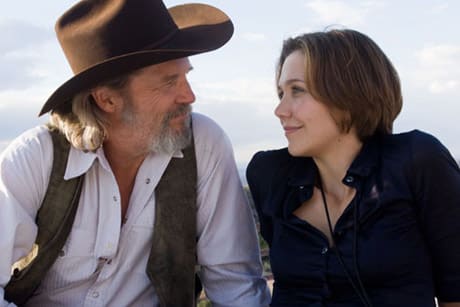Crazy Heart, in which Jeff Bridges adds another career achievement notch on his belt as a down-to-his-last-drink country singer, might be more difficult to watch for musicians than for average moviegoers.
Bad Blake (Bridges), who's on the wrong side of 50, is hauling his truck across Arizona and New Mexico, playing bowling alleys and small town bars for gas money and a meal. Actor turned writer/director Scott Cooper betrays no romanticism toward this life and these places - they are the depressing end of the road for Blake, a man who wrote some songs and enjoyed some success before being forgotten by aging fans and surpassed by his former sideman turned stadium country superstar (an uncredited and surprisingly solid Colin Farrell).
When he's approached by an aspiring music journalist (Maggie Gyllenhaal), it's with no illusions from either side - she makes bad choices with men but can't resist his grizzled charms, he's taking what's there at first, before realizing that she's actually something rarer than that in his life.
The right details aren't just in the overflowing ashtrays or the random sameness of the roadside motel - Bridges acquits himself quite well as a gruff-voiced singer; in fact, at times the resemblance to singer-turned-actor Kris Kristofferson is so strong one wonders if he wasn't considered for the role. (Many original songs are actually written by Stephen Bruton, a long-time Kristofferson sideman.)
But Crazy Heart isn't about the music, it's about the soul of a man who's known no other life and thus has few coping mechanisms for, say, Gyllenhaal's young son or for relationships that aren't defined by the length of time spent in any given town. In its subtle simplicity, Bridges gives one of the great performances in a career packed with underrated highlights.
Early buzz about the story of Bad Blake has cited another recent down-on-his-luck, bravura performance, The Wrestler, but Crazy Heart belongs to a much longer tradition of other-side-of-fame music stories, from which The Wrestler borrows some of its moves. It might seem familiar but like a great song you've long loved, it's a story worth hearing again.
(Searchlight Pictures)Bad Blake (Bridges), who's on the wrong side of 50, is hauling his truck across Arizona and New Mexico, playing bowling alleys and small town bars for gas money and a meal. Actor turned writer/director Scott Cooper betrays no romanticism toward this life and these places - they are the depressing end of the road for Blake, a man who wrote some songs and enjoyed some success before being forgotten by aging fans and surpassed by his former sideman turned stadium country superstar (an uncredited and surprisingly solid Colin Farrell).
When he's approached by an aspiring music journalist (Maggie Gyllenhaal), it's with no illusions from either side - she makes bad choices with men but can't resist his grizzled charms, he's taking what's there at first, before realizing that she's actually something rarer than that in his life.
The right details aren't just in the overflowing ashtrays or the random sameness of the roadside motel - Bridges acquits himself quite well as a gruff-voiced singer; in fact, at times the resemblance to singer-turned-actor Kris Kristofferson is so strong one wonders if he wasn't considered for the role. (Many original songs are actually written by Stephen Bruton, a long-time Kristofferson sideman.)
But Crazy Heart isn't about the music, it's about the soul of a man who's known no other life and thus has few coping mechanisms for, say, Gyllenhaal's young son or for relationships that aren't defined by the length of time spent in any given town. In its subtle simplicity, Bridges gives one of the great performances in a career packed with underrated highlights.
Early buzz about the story of Bad Blake has cited another recent down-on-his-luck, bravura performance, The Wrestler, but Crazy Heart belongs to a much longer tradition of other-side-of-fame music stories, from which The Wrestler borrows some of its moves. It might seem familiar but like a great song you've long loved, it's a story worth hearing again.
